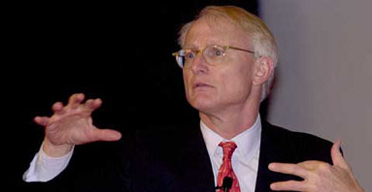NAIROBI, July 30 – We continue with the second and final part of an exclusive interview with Michael E. Porter, the Bishop William Lawrence University Professor based at Harvard Business School (HBS).
HBS describes Prof Porter as “a leading authority on competitive strategy” and “the father of the modern strategy field.”
He was in Nairobi recently at the invitation of the Strathmore Business School where he lectured Kenya’s crème de la crème on competitiveness.
Q. One of your case studies here is Rwanda. And we are similar in many ways. We both had tribal based violence and we are both agri-based economies. What can we learn from its (Rwanda) turn around in the last 15 or so years (post-genocide)?
A. Rwanda has had a much more disciplined and performance-oriented government structure. Rwanda is not anywhere near perfect. It is a work in process.
But there has been a leadership and an orientation about driving things forward and getting things done. So, in Rwanda if there is a problem identified, then you come back a year or two later, that problem has been addressed. It may not be perfect.
That really starts in Rwanda with leadership. President (Paul) Kagame is a very disciplined leader, he is very results oriented. He holds his people accountable. If a minister does not do things right, he is fired.
He is very careful about having representatives from different parts of the society but that doesn’t mean you are protected. If you don’t do a good job you leave.
If Rwanda had 100th of Kenya’s professional talent it would be Switzerland!
Q. So, do you think it’s lethargy on the part of our government (Kenya) to get things done?
A. I think it’s some kind of…lethargy means lazy…People here are too tangled up in their own little interests. And there’s not a sense that we are public servants. This is about our society. We have to get things done. It is not acceptable to have the road to the airport sit for years and years and years.
I don’t think it’s a lack of talent. I don’t think it’s a lack of inherent competitive potential. I don’t think it’s a lack of even money.
I think it’s a lack of some kind of institution and government and leadership.
Kenya has made some significant progress in the last 20 or 30 years. But there’s a gap here that somehow has to be surmounted.
Q. If you were to have a top five on what we should work on, what would those be and what would you advise proportional spending should be?
A: I don’t know what to spend on what; I don’t know that much about the country. But there needs to be a substantial investment in the sheer physical infrastructure for moving goods and people around.
Kenya should be a logistical hub, a major gateway for the region, but its suffering in terms of just pure physical infrastructure.
So we have a railroad but it doesn’t work. We have roads but they don’t get fixed or they don’t get built.
Number two: Kenya needs to attract, significantly, more foreign investment.
Right now the business environment and the rules and the regulations and the bureaucracy are too great, to onerous, too complicated.
And related to that is the issue of corruption.
There’s still too much corruption and favouritism. You have to know the right person. And so I would say some kind of tremendous streamlining and simplification of the entire regulatory environment for doing business needs to be done.
If we got those two things done, this country would boom for 20 years.
Q. How do you attract foreign investment and maintain your competitiveness?
A: By attracting foreign investment you increase your competitiveness.
What this country needs is access to distribution channels. It needs sophisticated managerial skills; it needs technology. To build a competitive economy you need a combination of local and foreign firms. If you look at the data, Kenya is very striking. Kenya is not really taking advantage of the tremendous power of foreign investment to accelerate the development process.
Q. Because you are trying to protect the home industries?
A: You are trying to protect the home industries but they are inefficient and uncompetitive and don’t provide good service and don’t meet the needs of the customer. So what are you really protecting? You are better off allowing a foreign company to come in and then the local companies are going to have to compete to meet the standards.”
“Then all of a sudden the standard goes up. You don’t want to give foreign companies any advantages. You just want to give them the opportunity to drive competition and raise the standard.”
There are many fields in which Kenya has no significant local companies and so you need to invite foreign companies to come in and, sort of, accelerate the process.
But there has been a weariness of foreign investment here that is holding the economy back.
A country of 35 million people is tiny. You can’t do everything in Kenya. Even the US, there’s tremendous foreign investment cause it can’t master all the technologies. You can’t try to be self sufficient anymore.
You are going to have to depend on the rest of the world. You are going to want to export the stuff you make productively. You are going to have to import. The single most predictor for the success for productiveness for countries is openness. Does it welcome ideas and people and capital and technology?
When Kenya became independent I can understand that thinking. Yes when you’ve been colonised, you can understand people’s psychology ‘We want to run our own show’ correct. But its 2008, this is a small country. The country simply has to step up and be part of the world economy.
Q. So how do you develop the local companies? Does that mean more incentives from government to help them get the critical capital to compete with global giants?
A. Yes, you need to have an efficient banking system and a fair and open capital markets so companies can raise capital. But I don’t think the problems though are so much the inability to raise capital.
I think the problems in this country are that business has been a matter of who you know, what concessions you have and whether you have government support.
There have been all these complicated market distortions and impediments.
Companies here have no idea how to compete because they have not been in an environment where that is not necessary for success. So I’d start by removing as many of these internal restrictions as possible.
Having talked to a bunch of Kenyan businessmen, I don’t think they fear the market nearly as much as the government does. Kenyan businessmen are very confident, quite entrepreneurial. They do quite well internationally.
You put a Kenyan anywhere else in the world and they’re great. But something about the society has created this environment in Kenya. I think its holding back a lot of inherent potential.
But if I go to Rwanda, there are no professionals. To find them; it’s like finding a nugget of gold. In Kenya there are lots of people who are well trained but a lot of them leave because they get so frustrated trying to operate in this society.
So, I think this country is waiting to happen.
Porter has a professorship from Harvard University. Harvard Business School and Harvard University jointly created the Institute for Strategy and Competitiveness, dedicated to furthering Professor Porter’s work.




































